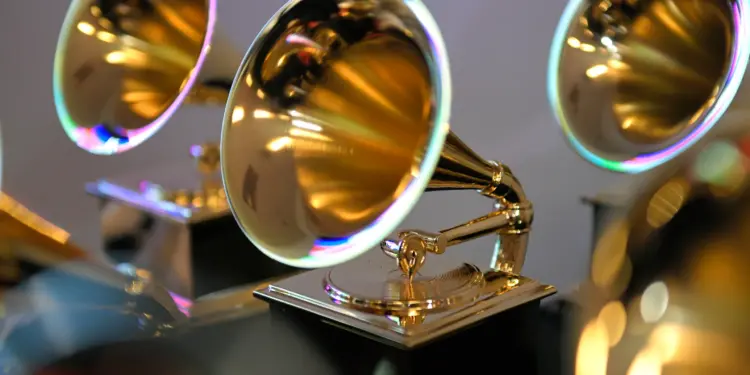The Grammy Recording Academy recently announced the addition of three new categories to the 2024 Grammy Awards, including the Best African Music Performance. This comes as a huge and significant development for the Ghanaian music industry and Africa as a whole.
Well, we probably should have seen this coming after September 25, 2022, when the Chief Executive Officer (CEO) of the Recording Academy, Harvey Mason Jr. visited Ghana for the first time. One of the profound remarks that headlined his visit was he professing the Recording Academy’s interest in music from the continent. He also described Ghana as bursting with creativity and art.
The new category is said to encompass a wide range of African music genres including Afrobeat, Afro-fusion, Afro-Pop, Afrobeats, Alte, Amapiano, Bongo Flava, Genge, Kizomba, Chimurenga, High Life, Fuji, Kwassa, Ndombolo, Mapouka, Ghanaian Drill, Afro House, South African Hip-Hop, and Ethio Jazz genres. However, according to the Recording Academy, the category is not limited to these genres.
Of particular importance to Ghana is the recognition of two indigenous genres, Highlife and Ghanaian Drill, within this prestigious category.
Highlife comes across as a traditional Ghanaian music genre that has been around for over a century. It is a blend of indigenous Ghanaian music with Western influences, and is known for its upbeat tempo and catchy melodies. Ghanaian Drill is a newer genre that emerged in recent years and garnered its highs amidst the Covid-19 period in 2020 – much echoed by the Asaaka Boys, Yaw Tog, Kweku DMC and others recognized for the birth and growth of the “Kumerican” movement. The Kumerican label, a term used to describe drill musicians from the Ashanti Region of Ghana gained momentum and received support from the Asante people, and is a subgenre of the popular drill music which is characterized by its dark, deep and aggressive sound.
For years, African artists and their diverse musical expressions have been gaining global recognition, and this inclusion is a significant step towards acknowledging the dexterity and influence of African music.
The inclusion of Highlife and Ghanaian Drill in the Best African Music Performance category is a recognition of the rich, creative and musical heritage of Ghana. It is also a sign that the academy is taking notice of the growing popularity of African music around the world – significantly, the enormous talent rising from the Ghanaian music sphere.
For most industry folks like Juls, a celebrated British-Ghanaian producer and Grammy Recording Academy member, who has advocated extensively for the recognition of African artists, the introduction of the category is “a step in the right direction.”

In his recent interview with the BBC, he noted that the Grammys have been criticized in the past for not giving enough attention to African music. For what seems to be an obsession for some African arts, Juls rekindles the thought of the award being a Western scheme.
However, he believes that the introduction of the new category was long overdue for the organizers but remains confident of the fact that it will help to raise the profile of African music and give African artists a greater chance of winning a Grammy.
“I think because Africa has been growing in terms of the musical presence for such a long time it was very hard to ignore. It’s an African Music performance so it’s just one song. So, I can understand that people will feel a bit hard down because Afrobeats is the most popular one but I can guarantee that it’s going to be a bigger conversation that will involve all other different genres from across the continent,” he added.
Despite the overwhelming feeling associated with the new category, I believe that “just as great power comes with great responsibility,” so does “global recognition come with great responsibility” and in this regard, for Ghanaian artists both budding and elite.
Highlife is well known to have lasted over time. It has been widely embraced in Europe and we see that when our artists tour the continent. Now there is the Ghanaian drill that resonates well with people and has fairly received some flowers as the likes of Vic Mensa, Stormzy, and Chance the Rapper jumped on these tunes.
Maybe so early, but the question that dropped through was whether the Ghanaian drill could make it in the first year of the award’s introduction.
“I doubt any Ghanaian artists within the drill scene can win the category simply because we haven’t marketed the songs like Afrobeats. Afrobeats is still the leading genre. What drill had was a buzz when it started some 3 years ago. Our guys did well to sustain and amplify it but the crossover appeal compared to Afrobeats pales significantly,” Rahim Munir the Content Operations at Boomplay Ghana shared his take.
I believe the best thing anyone can do is to prepare, improve and stay consistent. The concern is in as much as the genre is widely embraced across the country, the difficulty lies in selling the brand for global recognition – especially now that we are all in for a massive boxed competition against colossal genres like Afrobeats.
The category presents us the chance to script a remarkable piece in the history books and give our artists a bigger audience, but also tasks everyone in the Ghanaian music cycle from the artists themselves to improve their capacity, the media, producers, publishers, promoters and even consumers as well if we truly want the Ghanaian drill genre to be a global force.

Rahim Munir agrees with the concept and believes this latest development “confirms that we are doing something right in terms of projecting our arts.”
Rahim also notes that the new category poses a challenge to Ghanaian artists, particularly with the Ghanaian drill. He indicated that Ghanaian artists will need to “be deliberate in promoting more drill sounds, making quality music to meet international standards and being professional in their dealings” in other to stay afloat and compete with “big” genres.
Despite the challenges, Rahim is optimistic and rightly so, about the future of Ghanaian music. He reiterated his belief that Ghanaian artists have the talent and creativity to succeed in the global music market.
He opined that for a country that is particularly known for “killing” a genre before it even grows roots, one way to make Ghanaian drill stay relevant among the lots is to put out more drill-sounding songs of good quality. “If you have noticed in recent times, the Asakaa boys, Kweku flick and others are all innovating their sound by infusing a lot more highlife/hiplife elements. The innovation guarantees a longer shelf life for a genre.”







